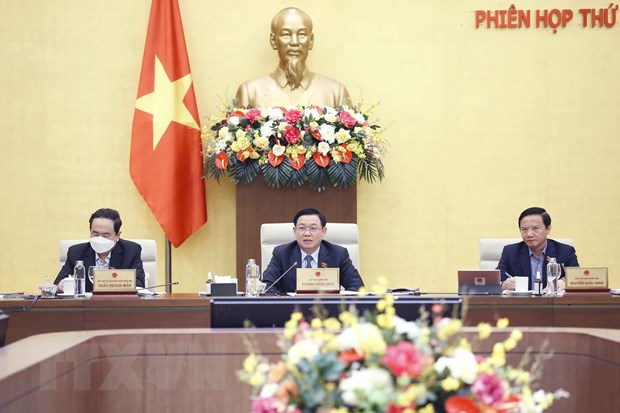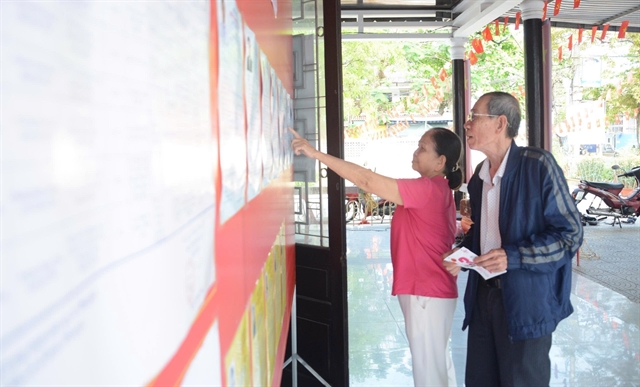 Politics & Law
Politics & Law

Deputies approved the draft Resolution on explaining Clause 1, Article 289 of the 2015 Penal Code at the fifth session of the Nation Assembly Standing Committee on Tuesday.

|
| Nation Assembly Chairman Vương Đình Huệ chaired the fifth session of the National Assembly Standing Committee on Tuesday. —VNA/VNS Photo Doãn Tấn |
HÀ NỘI — Deputies approved a draft Resolution on Clause 1, Article 289 of the 2015 Penal Code at the fifth session of the Nation Assembly Standing Committee on Tuesday.
The session was chaired by NA Chairman Vương Đình Huệ.
The draft resolution explains Clause 1 as follows: acts of intentionally bypassing alarms, access codes, firewalls, using other people's administrative rights or using other methods to illegally infiltrate other people's computer networks, telecommunications networks, or electronic means to steal data specified in Clause 1 is understood to include the acts of intentionally bypassing alarms, access codes, firewalls, using other people's administrative rights or using other methods to illegally infiltrate other people's computer networks, telecommunications networks, or electronic means to illegally appropriate data containing business secrets by listening, reading, taking notes, taking pictures, recording audio or video recordings.
According to the NA Committee for Judicial Affairs, the explanation already includes “data containing business secrets”, therefore, it met the requirements of criminal handling of violations of business secrets of the Comprehensive and Progressive Agreement for Trans-Pacific Partnership (CPTPP) that Việt Nam joined in 2018.
The deputies said according to the roadmap, the implementation of Việt Nam's commitments in the CPTPP with criminal handling of violations of business secrets will be taken from 2022.
Therefore, the approval of the Resolution at the time is believed to be suitable, the deputies said.
The deputies also agreed with the valid date of the Resolution beginning January 14, 2022.
The Government, the Supreme People's Court and the Supreme People's Procuracy within their functions, tasks and powers, have to implement the Resolution.
Laws on medical examination, radio frequencies
Also on Tuesday morning, the National Assembly Standing Committee considered the Government’s proposals on adding two draft laws to the Law and Ordinance Building Programme 2022: the law amending and supplementing some articles of the Law on Radio Frequencies, and the revised Law on Medical Examination and Treatment.
For the revised Law on Medical Examination and Treatment, the committee suggested that the Ministry of Health continue completing the law and submit it to the committee for consideration before it is included in the Law and Ordinance Building Programme 2022.
Huệ said that the amendment of the Law on Medical Examination and Treatment is very important and urgent, so it should be completed and submitted to the National Assembly soon.
“Putting patients at the centre is believed to be the viewpoint of building the law,” he said.
Besides, it should continue implementing the policy of privatisation and diversifying types of health services to ensure equity in public and private health facilities as well as speeding up administrative procedures and applying information technology in medical examination and treatment, he said.
Huệ said for the Law on Radio Frequencies, it is necessary to clarify the impact assessment report when amending the law, including the impact assessment on socio-economic, national defence – security and the new administrative procedures.
It also needs to clarify the compatibility of the law on radio frequencies with other laws of planning, investment, telecommunications, he said.
The amendment of the law must ensure to comply with international treaties and commitments, especially new-generation trade agreements, he said.
“It should consider radio frequencies as important national assets,” he said.
Radio frequencies become more and more valuable while the country is moving towards the digital economy and society, he said.
Therefore, it is necessary to regulate issues relating to the radio frequencies in the direction of ensuring strict management and use as well as effective and healthy exploitation, he said.
The amendment of the law has to evaluate the maximum frequency that each enterprise can hold and points out solutions to prevent problems in the accumulation of frequency resources, he said.
Moreover, the impact assessment report in the law must assess the current management and exploitation of the radio frequencies; the status of the collection of fees and charges; and give the forecast of revenue and methods of collection of fees and charges after the law is amended, especially radio frequencies with high commercial value, he said.
The law needs to prescribe policies to raise the responsibility of organisations and individuals involved in the process of using the radio frequencies, to ensure safety, efficiency and to avoid loss or waste.— VNS




